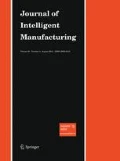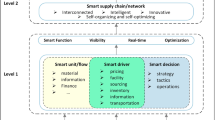Abstract
This paper concentrates on the problem of automated negotiations in e-supply network coordination (e-SNC). Supply network is considered as a collection of agent-mediated decisions and coordination mechanisms in a web-based environment. The proposed agent based coordination model is composed of two negotiator agents and a coordinator agent. The coordination mechanism begins with determining the feasible and most promising partners in the network based on the similarity of profiles. In response to autonomy levels and conflict objectives, the model allows agents to negotiate in a cooperative manner through an iterative process of generating offers for re-establishing global optimality. The dynamic negotiation model is then defined based on the protocol, rule of bargain, proposal generation, and dynamic strategy. To illustrate the model efficiency, a prototype system has been modeled and is compared to the normal tendering mechanism. The validation results confirm the model efficiency in providing coherent decision making in a dynamic environment.
Similar content being viewed by others
References
Aviv Y. (2001) The effect of collaborative forecasting on supply chain performance. Management Science 47(10): 1326–1343
Bannerjee A. (1986) A joint economic lot size model for purchaser and vendor. Decision Science 17(3): 292–311
Buttner, R. (2006). A classification structure for automated negotiations. In Proceedings of international conference on web intelligence and intelligent agent technology, (WI-IATW’06).
Cheng C. B., Chan C. H., Lin K. C. (2006) Intelligent agent for e-marketplace: Negotiation with issue trade-offs by fuzzy inference systems. Decision Support Systems 42: 626–638
Choi S. P. M., Liu J., Chan S.-P. (2001) A genetic agent-based negotiation system. Computer Networks 37: 195–204
Chu C. L., Leon V. J. (2009) Scalable methodology for supply chain inventory coordination with private information. European Journal of Operational Research 195: 262–279
Faratin P., Sierra C., Jennings N. R. (2002) Using similarity criteria to make issue trade-offs in automated negotiations. Artificial Intelligence 142: 205–237
Fazel Zarandi M. H., Pourakbar M., Turksen I. B. (2008) A fuzzy agent-based model for reduction of bullwhip effect in supply chains. Expert Systems with Applications 34(3): 1680–1691
Fukuyama, Y., & Sugeno, M. (1989). A new method of choosing the number of clusters for fuzzy c-means method. In Proceeding of 5th fuzzy systems symposium (in Japanese), (pp. 247–250).
Goyal S. K. (1977) An integrated inventory model for a single supplier single customer problem. International Journal of Production Research 15(1): 107–111
Ito T., Mousavi Jahan Abadi S. M. (2002) Agent-based material handling and inventory planning in warehouse. Journal of Intelligent Manufacturing 13(3): 201–210
Kaplan S., Sawhney M. (2000) E-hubs: The new B2B market-places. Harvard Business Review 78(3): 97–100
Karimi R., Lucas C., Moshiri B. (2007) New multi attributes procurement auction for agent-based supply chain formation. International Journal of Computer Science and Network Security 7(4): 255–261
Ke-xing, L., Yu-qiang, F., & Shao-bin, D. (2007). Dynamic strategies for agent based automated negotiation in e-commerce. In Proceeding of 14th international conference on management science & Engineering, China, (pp. 168–173).
Kimbrough S. O., Wu D. J., Zhong F. (2002) Computers play the beer game: Can artificial agents manage supply chains?. Decision Support Systems 33(3): 323–333
Lee C. C., Yang C. O. (2009) A neural networks approach for forecasting the supplier’s bid prices in supplier selection negotiation process. Expert Systems with Application 36: 2961–2970
Li, W. L., & Yang, J. (2008). Automated negotiation based on prioritised fuzzy constraint satisfaction problem. In Proceeding of 5th international conference on fuzzy systems and knowledge discovery, (pp. 205–209).
Li X., Wang Q. (2007) Coordination mechanisms of supply chain systems. European Journal of Operational Research 179: 1–16
Liu J., Jing H., Tang Y. Y. (2002) Multi-agent oriented constraint satisfaction. Artificial Intelligence 136(1): 101–144
Lu L., Wang G. (2008) A study on multi-agent supply chain framework based on network economy. Computers and Industrial Engineering 54: 288–300
Luo X., Zhang C., Leung H. F. (2001) Information sharing between heterogeneous uncertain reasoning models in a multi-agent environment: A case study. International Journal of Approximate Reasoning 27(1): 27–59
Mahdavi I., Mohebbi S., Cho N., Paidar M. M., Mahdavi-Amiri N. (2008) Designing a dynamic buyer-supplier coordination model in electronic markets using stochastic Petri nets. International Journal of Information Systems and Supply Chain Management 1(3): 1–20
Mahdavi I., Mohebbi S., Zandakbari M., Cho N., Mahdavi-Amiri N. (2009) Agent-based web service for the design of a dynamic coordination model in supply networks. Journal of Intelligent Manufacturing 20(6): 727–749
Mohebbi, S., & Shafaei, R. (2009). Designing an intelligent negotiation model in e-supply network coordination. In IEEE international conference on service operations, logistics and informatics (SOLI), Chicago, USA, (pp. 123–128).
Nassiri-Mofakham F., Nematbakhsh M. L., Baraani-Dastjerdi A. (2009) Electronic promotion to new customers using mkNN learning. Information Sciences 179: 248–266
Oliver J. R. (1997) A machine-learning approach to automated negotiation and prospects for electronic commerce. Journal of Management Information Systems 13(3): 83–112
Raiffa H. (1982) The art and science of negotiation. Harvard University Press, Cambridge, MA
Sadeh N. M., Hildum D. W., Kjenstad D. (2003) Agent-based e-Supply chain decision support. Journal of Organizational Computing and Electronic Commerce 13(3–4): 225–241
Schneeweiss C., Zimmer K. (2004) Hierarchical coordination mechanisms within the supply chain. European Journal of Operational Research 153(3): 687–703
Sugeno T., Yasukawa T. (1993) A fuzzy-logic-based approach to qualitative modelling. IEEE Transactions on Fuzzy Systems 1(1): 7–31
Walton R. E., McKersie R. B. (1965) A behavioural theory of labour negotiation. McGraw-Hill, New York
Wang M., Wang H. (2006) From process logic to business logic—A cognitive approach to business process management. Information and Management 43(2): 179–193
Wang M., Wang H., Xu D. (2005) The design of intelligent workflow monitoring with agent technology. Knowledge-Based Systems 18(6): 257–266
Wang M., Liu J., Wang H., Cheung W. K., Xie X. (2008) On-demand e-supply chain integration: A multi-agent constraint-based approach. Expert Systems with Applications 34(4): 2683–2692
Weiss, G. (eds) (1999) Multi-agent systems: A modern approach to distributed artificial intelligence. MIT Press, Cambridge, MA
Weng Z. K. (1999) The power of coordination decisions for short life cycles products in a manufacturing and distribution supply chain. IIE Transactions 31: 1047–1049
Wooldridge M. (2002) An introduction to multi-agent systems. Wiley, New York
Xue X., Wang Y., Shen Q., Yu X. (2007) Coordination mechanisms for construction supply chain management in the internet environment. International Journal of Project Management 25(2): 150–157
Author information
Authors and Affiliations
Corresponding author
Rights and permissions
About this article
Cite this article
Mohebbi, S., Shafaei, R. e-Supply network coordination: the design of intelligent agents for buyer-supplier dynamic negotiations. J Intell Manuf 23, 375–391 (2012). https://doi.org/10.1007/s10845-009-0377-4
Received:
Accepted:
Published:
Issue Date:
DOI: https://doi.org/10.1007/s10845-009-0377-4




